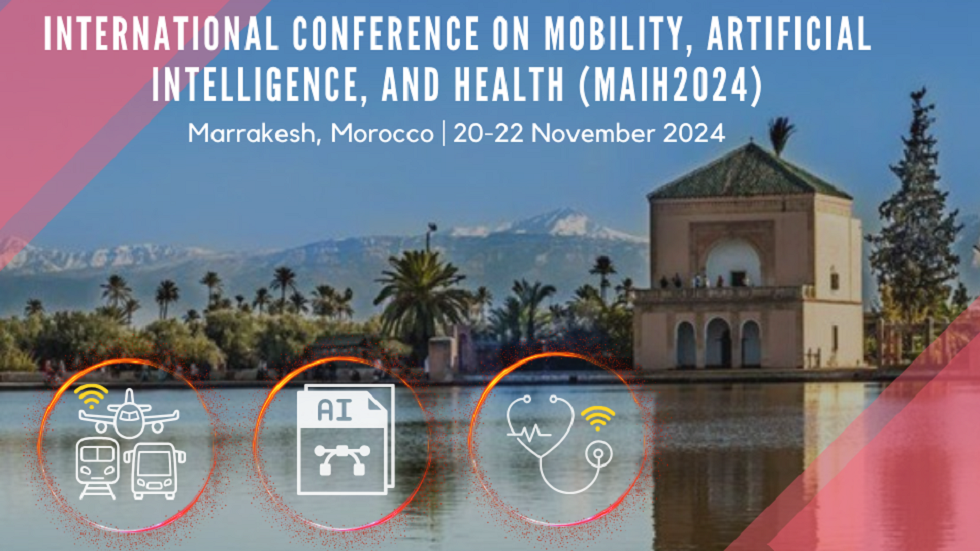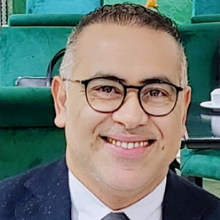
|
|
|
Invited SessionsMAIH24 konferentsiyasi uchun ishtirokchilar taklif qilingan sessiyalarni tashkil qilishlari mumkin . Bunday holda, mavzular Konferentsiya doirasiga kirishi va etarlicha aniq bo'lishi kerak (va juda keng emas). Ushbu taklif qilingan sessiyalarga hissalar muntazam ravishda qog'oz shaklida bo'lishi mumkin. Taklif etilgan sessiyalar ma'lum bir tadqiqot mavzusi bo'yicha va tashkilotchilarning shaxsiy taklifiga binoan 5 dan 8 ta Taklif etilgan sessiya taklifi 6 sahifa bilan cheklanishi kerak (konferentsiya shablonida) va quyidagilarni o'z ichiga olishi kerak:
Agar siz taklif qilingan sessiyani tashkil qilmoqchi bo'lsangiz, potentsial ma'ruzachilar va ishtirokchilarni so'rang. Ishtirokchilaringiz bor boʻlsa, taklifingizni ………… dan onlayn yuborishingiz mumkin. …….. 2024 yilgacha. Taklif yuborilgandan so'ng, tashkilotchilar sessiya uchun kod oladi. Kod hissa qo'shuvchilarga tarqatilishi kerak, bu ularning hujjatlarini topshirish vaqtida kerak bo'ladi. Taklif etilgan sessiyalarni ko'rib chiqishHar bir qog'oz alohida ko'rib chiqiladi. Taklif etilgan sessiya takliflari ham bir butun sifatida baholanadi. Dastur qo'mitasining taklifiga ko'ra, alohida maqolalar taklif qilingan sessiyadan olib tashlanishi va muntazam dasturga joylashtirilishi va tegishli taqdim etilgan maqolalar sessiyalarga ko'chirilishi mumkin. Xuddi shunday, rad etilgan taklif qilingan sessiyalardan tanlangan maqolalar muntazam dasturga joylashtirilishi mumkin. AloqaTaklif etilgan sessiyalar haqida qo'shimcha ma'lumot olish uchun quyidagi elektron pochta manzili orqali biz bilan bog'laning: Elektron pochta : maihconf24@gmail.com ------------------------------------------------- ------------------------------------------------- ------------------------------------------------- ----------- Professor Intissar Haddiya
Sog'liqni saqlashda sun'iy intellekt: eng yaxshi amaliyotlarga e'tibor Annotatsiya: Sog'liqni saqlash sohasi sun'iy intellekt (AI) tomonidan boshqariladigan sezilarli o'zgarishlarni boshdan kechirmoqda. Klinik amaliyotda sun'iy intellekt ilovalari bemorlarni parvarish qilish uchun ko'plab imtiyozlarni taklif etadi, jumladan, erta va aniqroq tashxis qo'yish, shaxsiylashtirilgan davolanishni rejalashtirish va virtual yordamchilar orqali ma'lumotlarga kirishni yaxshilash. Biroq, bu potentsial bilan bir qatorda, muammolar va axloqiy mulohazalar hamon saqlanib qolmoqda. Ma'lumotlarning maxfiyligi, algoritmik tarafkashlik, AI qarorlarini qabul qilishning shaffofligi va mas'uliyatli foydalanish ehtiyotkorlik bilan e'tibor talab qiladigan muhim sohalardir. Bizning taqdimotimiz sog'liqni saqlash muassasalarida mustahkam ilg'or tajribalarni o'rnatish va klinisyenler, ma'lumotlar olimlari, bemorlar va siyosatchilar o'rtasida hamkorlikni rivojlantirish muhimligini ta'kidlaydi. Sun'iy intellekt texnologiyalarini sinchiklab ko'rib chiqish va doimiy takomillashtirish orqali biz axloqiy me'yorlar va sog'liqni saqlash ustuvorliklarini qo'llab-quvvatlagan holda bemorning natijalarini yaxshilash uchun uning salohiyatidan foydalanishimiz mumkin.
Qo'shimcha ma'lumot uchun ( bu yerni bosing ) ------------------------------------------------- ------------------------------------------------- ------------------------------------------------- ----- Professor Amr MAOUJUD
AI va algoritmlarni umumlashtirish bilan: Bizga hali ham dializ xonasida nefrolog kerakmi? Annotatsiya: Sun'iy intellekt (AI) va ilg'or algoritmlar sog'liqni saqlash sohasida inqilob qilib, nefrologiya va dializga sezilarli o'zgarishlar kiritadi. Mening tadqiqotim, " AI va algoritmlarni umumlashtirish bilan: Bizga hali ham dializ xonasida nefrolog kerakmi? ", AI dializni davolashni qanday o'zgartirishi va muhim bilim bo'shlig'ini to'ldirishi haqida o'rganadi. Ushbu konferentsiyada biz AI bemorlarning turli dializ muolajalariga qanday javob berishini bashorat qilish orqali bemorning natijalarini qanday yaxshilashi mumkinligini o'rganamiz, bu esa yuqori darajada shaxsiylashtirilgan parvarish rejalarini yaratish imkonini beradi. Shuningdek, sun'iy intellekt dializ markazlarining yanada samarali ishlashiga yordam beradi va xizmatlar sifatini oshiradi. Bundan tashqari, sun'iy intellekt asosida ishlaydigan uzluksiz monitoring va erta ogohlantirish tizimlari o'z vaqtida tibbiy aralashuvni ta'minlaydi va bemor xavfsizligini oshiradi. Muhimi, tadqiqot AI nefrologlarni almashtirish uchun emas, balki qo'llab-quvvatlash uchun mo'ljallanganligini ta'kidlaydi. Muntazam vazifalarni avtomatlashtirish va murakkab qarorlar qabul qilishda yordam berish orqali AI nefrologlarga bemorni parvarish qilish uchun ko'proq vaqt ajratishga imkon beradi. Tadqiqot shuningdek, bemorning shaxsiy hayoti, ma'lumotlar xavfsizligi va sun'iy intellektda adolatlilik kabi axloqiy masalalarni ko'rib chiqadi va undan mas'uliyatli foydalanishni ta'minlaydi. Ushbu tadqiqot nafaqat nefrologiyaga, balki tibbiyotning barcha sohalariga tegishli bo'lib, AIning bemorlarga yordam ko'rsatish va sog'liqni saqlash sohasidagi samaradorlikni oshirish imkoniyatlarini namoyish etadi. Ushbu bilim bo'shlig'ini bartaraf etish orqali tadqiqot sun'iy intellektni tibbiy amaliyotga axloqiy va samarali integratsiya qilish rejasini taklif qiladi, bu esa sun'iy intellektning o'zgaruvchan kuchidan foydalanishni istagan tibbiyot mutaxassislari uchun zarur qiladi. Qo'shimcha ma'lumot uchun ( bu yerni bosing ) ------------------------------------------------- ------------------------------------------------- ------------------------------------------------- ----- Professor Najib Al Idrissiy
Sun'iy intellekt va ulangan salomatlik
Annotatsiya: Sun'iy intellekt (AI) va bog'langan sog'liqni saqlash diagnostika, davolash va bemorlarni parvarish qilishni yaxshilash orqali sog'liqni saqlash sohasini o'zgartirmoqda. AI algoritmlari rentgen, MRI va skanerlar kabi tibbiy tasvirlarni tahlil qilishi mumkin, bu ko'pincha o'smalar, sinishlar va yurak-qon tomir kasalliklari kabi holatlarni aniqlashda professional shifokorlarning aniqligiga mos keladi yoki undan oshadi. Bundan tashqari, sun'iy intellekt genetik ma'lumotlar tahlilini osonlashtiradi, irsiy kasalliklar xavfini baholash va davolash usullarini shaxsiylashtirish, aniqlik va shaxsiylashtirilgan tibbiyotni rivojlantirishga yordam beradi. Bundan tashqari, sun'iy intellekt yordamidagi jarrohlik tizimlari aniqroq va minimal invaziv muolajalarni amalga oshirish imkonini beradi, bu esa bemorning natijalarini yaxshilashga va sog'liqni saqlash imkoniyatlarini kengaytirishga olib keladi. Qo'shimcha ma'lumot uchun ( bu yerni bosing ) ------------------------------------------------- ------------------------------------------------- ------------------------------------------------- ----- Professor Abdelhafid El Ouardi va professor Serxio Rodriges Flores Uskuna-dasturiy ta'minot Codesign sohasidagi yutuqlar Intellektual transport tizimlarida qo'llaniladi Annotatsiya: Ilmiy tadqiqotlar shuni ko'rsatadiki, baxtsiz hodisalarning katta qismi inson xatolaridan kelib chiqadi va bu muammoni hal qilish uchun texnologik takomillashtirish zarurligini keltirib chiqaradi. O'rnatilgan apparat arxitekturalari bilan idrok etish, haydashga yordam berish, ma'lumotlarni tahlil qilish va boshqarish tizimlarini loyihalashda duch keladigan qiyinchiliklar sensor interfeyslari, hisoblash quvvati, vaqt va energiya sarfi kabi cheklovlarni o'z ichiga oladi. O'rnatilgan tizimlardagi ilovalar, ayniqsa real vaqt kontekstida, tobora murakkablashib borayotganligi sababli, algoritm-arxitektura xaritalash yondashuviga, xususan, rivojlanayotgan AIga asoslangan tizimlarni ishlab chiqishda ehtiyoj bor. Idrok avtomatlashtirilgan transport tizimlarini loyihalashda muhim element sifatida paydo bo'ladi, bunda qarorlar qabul qilish, traektoriyani rejalashtirish va boshqarish funktsiyalari avtomobil va uning atrof-muhit haqida ma'lumot olish va tahlil qilishga tayanadi. Ushbu keng qamrovli yondashuv samarali tizimlarni loyihalash imkonini beruvchi dasturiy-apparat kodlashda optimallikni izlaydi. Ushbu sessiya robototexnika va intellektual transport tizimlari sohasida apparat-dasturiy ta'minot kodini yaratish bo'yicha so'nggi va ilg'or tadqiqot ishlarini taqdim etish va muhokama qilishga bag'ishlangan. Qo'shimcha ma'lumot uchun ( bu yerni bosing )
|






